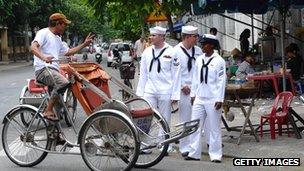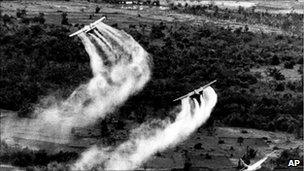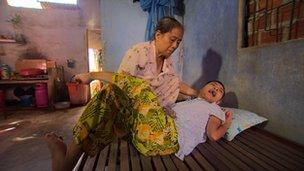One Square Mile of Vietnam: Da Nang
- Published
One Square Mile: Vietnam
Da Nang is one of Vietnam's major ports, a city rich in history. It was where the French first landed in the 19th Century in their quest to control the area and where US forces established a large air base during the Vietnam war.
The roads are broad and inviting, the boulevards that run along the riverfront are clean and filled with quaint little riverside cafes.
The mix of old and new buildings in many parts of the city gives you a real sense of how much this place has changed over the years.
A lot of money has been pumped into this city and it shows. The local government wants to turn it into Vietnam's most liveable city.
But Da Nang is also known for having one of the highest contaminations of dioxin from the use of Agent Orange by US forces during the Vietnam war.
Dioxin is one of the most highly toxic pollutants. It can cause reproductive and developmental problems, damage the immune system, interfere with hormones and also cause cancer.

US sailors on a good will visit to Da Nang in 2011
In most countries dioxin levels must not exceed 1,000 ppt (parts per trillion) in soil. Industrialised nations have much lower levels of dioxin contamination in soil, on average, less than 12 ppt.
In Da Nang dioxin levels are found up to 365,000 ppt.
During the war, when Agent Orange was used to destroy dense foliage used by communist forces as cover, it was sprayed at up to 50 times the concentration the manufacturers recommended for killing plants.
It stripped bare millions of acres (hectares) of forests and farmland much of which remains degraded and unproductive to this day.
Da Nang airport was the main US airbase during the war and where huge stock piles of Agent Orange were stored.
Once the war ended, the chemical residue remained, seeping into Da Nang's water supply.
It's thought that three million Vietnamese have suffered from health problems caused by exposure to the dioxin in Agent Orange.

The US sprayed Vietnam's jungles to deprive the enemy of places to hide
US veterans who handled the poison were also affected. Over a million of them have received compensation for the effects of Agent Orange.
In the city, I met 30-year-old Huyen whose family believe that she is one of the living casualties of the war.
Her father, Tran Quang Toan, was a driver in the South Vietnamese army which was allied to the US military.
"We had heard the Americans were spraying the jungles with a chemical but these were just rumours," he tells me. "We didn't know if they were true. We were very poor so we had to use the water from the well near the airport."
His wife spends her days caring for Huyen while Mr Tran, now in his 60s, drags a huge wheelbarrow around the city, pulling building materials from one construction site to another to earn a living.
But now the US and Vietnamese governments are working together to try and heal the wounds of the past by cleaning up the poisoned soil.
It's an ambitious venture and, if successful, will serve as a blueprint for other Agent Orange hotspots in Vietnam.
Though the war and US participation ended in 1975, it was not until twenty years later that diplomatic relations were restored between the two countries, allowing the matter to be addressed.
"The whole project will cost $84 million," Joakim Parker, USAID Vietnam Mission Director, told me as we walked around the site.
The plan is to clean up hundreds of tonnes of poisoned soil by 2016 by baking it in special ovens that remove the toxins.

Huyen, who is 30, is given round-the-clock care by her mother
But even though both sides have come together to try and heal their past the scars of the war are still all too apparent in Da Nang.
I visited a day care centre for the young victims of Agent Orange where many children with biological and neurological problems are looked after.
There, Nguyen Thị Hien, chairwoman of Da Nang's Association of Victims of Agent Orange told me she feels putting the past to rest will require more than just a clean up of the airport site.
"It makes me angry, because not enough is done to help," she said.
"In some cases parents have passed away because of Agent Orange and their children who also suffer are left alone and eventually the family dies out."
- Published9 August 2012